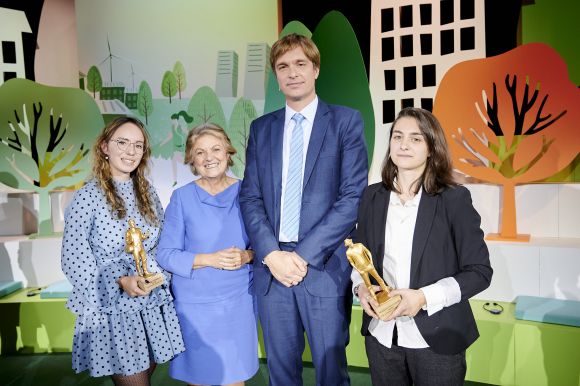
The Megalizzi-Niedzielski prize for aspiring journalists found its two new winners during the 20th European Week of Regions and Cities held in Brussels, Belgium. This recognition, which honours the memory of two journalists who passed away after a terrorist attack in Strasbourg in 2018, awards the effort and performance of professionals in the field. Only six have been nominated among the participants of the Youth4Regions programme for aspiring journalists, chosen across Europe and neighbouring countries.
In this year’s edition, the French journalist Laura Bannier and the Georgian Ani Arveladze received the prize at an event hosted by Elisa Ferreira, the Commissioner for Cohesion and Reforms, and Younous Omarjee, member of the European Parliament and President of the Committee on Regional Development (REGI). The awards ceremony was moderated by Stefan de Keersmaeker, the European Commission Coordinating Spokesperson for the European Green Deal.
The ceremony allowed the audience to meet with all the finalists, by whom Commissioner Ferreira declared to be “impressed”, including the German journalists Clara Hoheisel and Rahel Schuchardt, together with the Latvian Janis Ievins, and the Croatian Sonja Agata Bišćan. Within this international scope, their interests and journalistic methods are also divergent.
While Arveladze’s work focuses on the Georgian conflict – which demands a high level of commitment and high-risk conditions – Bišćan is a lawyer, a musician, and a journalist, who expresses her passion for communicating and has already collaborated with the European Union. Bannier is, as she herself declares, the “Swiss army knife of the Internet”, able to work by any means and to manage various sources and tools with absolute knowledge. Clara Hoheisel, who is considered one of the best journalists in her region, reflects her passion for raising challenging questions through written texts that can be read by any audience, thus promoting easy access to information.
Schuchardt is both a writer and a photographer, with a blog written in French and German and an interest oriented towards photographic portraits. She is a beneficiary of a scholarship that allows her to write about EU topics from a scientific perspective. Lastly, Ievins is an expert in international relations, namely in Russian and Eurasian activities, who is currently immersed in the Ukrainian invasion and whose Russian heritage connects him to the conflict. He explains the key tools needed for journalists: language skills to help consult academic sources in their original versions, time, and patience.
The winners also inspired the audience with a final message. On the one hand, Arveladze expressed her desire to keep the world informed about her country of Georgia until it joins the European Union and even after its membership; on the other, Bannier reclaimed the role of young women, who are often not taken seriously despite their talent. She highlighted the need for more women involved in decision-making in newsrooms and our duty to include them.
Commissioner Ferreira spoke with absolute clearness: we always have to do better. Omarjee emphasized that journalists support the European model and its values, they serve the truth and hence take part in public matters. He stressed that journalists need to be demanding since democracy grows along the search for truth. Both affirmed that the EU is acting on the protection of journalists with legislation such as the European Media Freedom Act. The reason behind the importance of these actions is given spotlight throughout the ceremony: independent journalism is the pillar of our democracies.
Beatriz Sánchez del Río | Edited by Vicky Hristova



